Back to the Drawing Board: The Worst Ship in History – Exxon Valdez
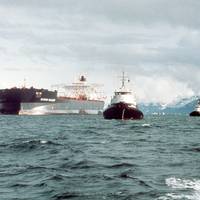
While Greg Trauthwein never assigns me column subjects, each time the Great Ships issue comes around I go with the theme. However, I try to take a view askew on that subject and have found that these are the rare columns where I am criticized for my views. Greg must enjoy that, and this year he asked me to write a column on the worst ship designs. That was the entire assignment, and it was unclear if he asked me to discuss the worst ship designs for 2023, or in the history of ship design.
Clean-up Crews Tackle Valdez Marine Terminal Oil Spill
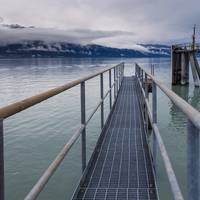
Clean-up crews were working to contain an oil spill at the Trans-Alaska Pipeline System's (TAPS) Valdez Marine Terminal, officials said on Wednesday, but the volume spilled was not preventing tankers from loading at the site.A sump overflow spilled oil into the water at the terminal on Sunday night. By Wednesday, clean-up crews had recovered 574 barrels (24,108 gallons) of an oil-water mix, authorities said.A team composed of system operator Alyeska Pipeline Service Co, the U.S.
BP Exits Alaska with $5.6Bln Sale
British oil major BP Alaska announced that it is selling its entire business to Hilcorp Alaska, marking the exit from Alaska after six decades.The $5.6 billion sale includes Opens a New Window. interests in the Prudhoe Bay oil field, Point Thomson gas field and the trans-Alaska pipeline system, BP said in a release.Bob Dudley, BP group chief executive, said: "Alaska has been instrumental in BP's growth and success for well over half a century and our work there has helped shape the careers of many throughout the company. We are extraordinarily proud of the world-class business we have built, working alongside our partners and the State of Alaska…
BP to Boost Stake in UK's 'Giant' Clair Field
BP announced that it has entered into agreements with ConocoPhillips that will significantly increase its holding in the Clair field, a core asset of BP’s North Sea business in the UK, while also selling its non-operating interest in the Kuparuk and satellite oilfields in Alaska. BP has entered into an agreement to purchase from ConocoPhillips a 16.5% interest in the BP-operated Clair field, west of Shetland in the UK, buying a ConocoPhillips subsidiary that will hold this interest in the field. As a result, BP will hold a 45.1% interest in Clair and ConocoPhillips will retain a 7.5% interest. Separately BP has entered into agreements…
Fight over Alaska Arctic Drilling has Just Begun
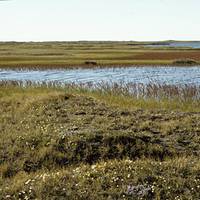
Senator Lisa Murkowski, an Alaska Republican, won a decades-long battle on Wednesday to open part of an Arctic wildlife reserve in her state to oil and gas drilling, but Democratic senators and conservationists vow the war has only begun. The tax bill passed by Congress contains language pushed by Murkowski and supported by President Donald Trump to hold two lease sales in the 1.5 million-acre (600,000-hectare) 1002 area on the northern coastal plain of the Arctic National Wildlife Refuge, or ANWR.
GoM Stakeholders Energized Despite Lingering Oil Bust
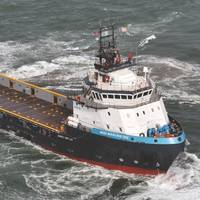
Gulf of Mexico vessel builders – and their customers – adapt to a lean offshore market. After oil prices plunged in late 2014 – pressured by shale output – demand for offshore vessels in the Gulf of Mexico shrank, day rates for boats fell and non-working units were idled. This year, several GoM boat builders filed for Chapter 11, or voluntary bankruptcy, while others consolidated. The most diversified companies kept their heads above water. Today, the outlook's a bit brighter. Crude oil prices hit bottom early last year. Tidewater Inc.
Sailing into the Arctic’s Future
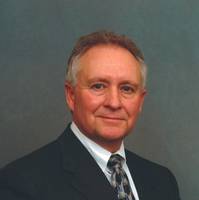
Last month, a large cruise ship completed its inaugural cruise through the Northwest Passage. The historic journey brought nearly 1,700 passengers from Seward, Alaska, past the rugged wilderness and isolated villages of the Arctic, to the concrete jungle of New York City. Along the way, passengers and crew were treated to a stunning contrast of climates, geography and culture. While understandable, concerns over passenger safety, wildlife disruptions and water pollution went unrealized during the historic cruise through the passage.
Alaska Oil Spill Protection: Crowley Bid for Alyeska Deal Unsuccessful
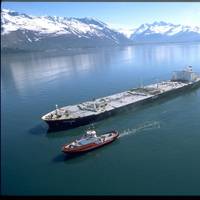
Press Release: Crowley Marine Services will not be providing oil spill prevention and response services in Valdez and Prince William Sound when its contract expires June 30, 2018. Crowley has provided marine services in Prince William Sound since 1990. Despite bidding aggressively for the SERVS contract extension, Crowley was not chosen by Alyeska to retain the entire scope of the current contract. Crowley is fully committed to continued professional service and full compliance as the marine service provider until the end of June 2018, and will be engaged in any transition process.
NOIA Welcomes BOEM Shell's Plan Conditional Approval
The BOEM's (Bureau of Ocean Energy Management) decision to conditionally allow Shell to proceed with the carefully planned and coordinated drilling effort in Alaska is good news. The potential for energy development in the Chukchi Sea would allow Alaskans to benefit from well-paying jobs and resources to safeguard the environment, protect native traditional activities, and improve communities. The Trans-Alaska Pipeline may also benefit from the flow of resulting production. For the rest of the U.S. and the world, successful oil and natural gas development in the area will help to meet the ever increasing demand for reliable, reasonably priced energy.
Oil Under Ice
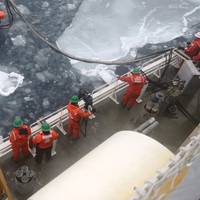
The U.S. How did an urgent requirement to build a road to Alaska end up helping to design submarines and to recover oil spills in the Arctic ice? The Army Corps of Engineers was faced with a monumental challenge of building a highway to connect the “lower 48” to Alaska during World War II to keep America’s northernmost territory secure from invasion. The road crossed hundreds of miles of wilderness, and much of the roadbed sat up permafrost, presenting challenges to America’s roadbuilders.
A History of U.S. Oil Export Controls
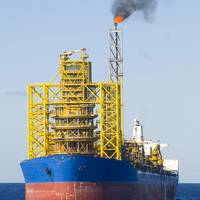
On Oct. 20, 1973, King Faisal of Saudi Arabia imposed a total embargo on oil shipments to the United States among other countries in response to their support for Israel during the Arab-Israeli war. Faisal's decision led directly to the introduction of a ban on U.S. crude exports, which remains in force in a slightly modified form and is now the focus of an intense struggle for reform. Following the U.S. mid-term elections next month, Congress will take up the issue again, a debate that would benefit from an understanding of the history behind the ban. On Oct.
Offshore Energy Timeline:1806-2014
1806 - Spring pole cable drilling developed in US. 1844 - Fluid circulating rotary well drilling patented in England. 1845 - Circulated fluid used to remove drill cuttings for first time. 1860 - Fluid circulation rotary diamond coring drill developed in France. 1869 – T homas Fitch Rowland patents a “submarine drilling apparatus,” a fixed, working platform for drilling offshore to a depth of almost 50 feet. The anchored tower had telescoping legs, similar to modern offshore platforms. 1878 - First bulk oil tanker begins operation in the Caspian Sea. 1891 - First ocean-going tanker launched. 1897 - Wells drilled off piers in Summerland, Calif. 1905 – Oil discovered in the Caddo Pine Island field in Lousiana. 1911 - Gulf Refining Co.
Treadwell: Arctic Security Should Be National Priority

Lt. Governor Mead Treadwell delivered the keynote address yesterday at the Arctic Collaborative Workshop in Fairbanks. Treadwell discussed five reasons why Arctic national security should be a national priority: energy development and security, shipping opportunities and safety, assessing and mitigating changes in climate and fisheries, attaining land access and territorial claims, and promoting the Arctic’s strategic position for military cooperation. “We need to go to the Arctic with purpose,” Treadwell said.
ANS oil production to fall 1.8 pct for fiscal year
Alaska's North Slope oil production is forecast to decline 1.8 percent for the fiscal year ending June 30 instead of falling 3 percent as predicted in December, according to a report released this week. The Alaska Department of Revenue predicts production of 521,800 barrels a day (bpd) versus its December forecast of 508,200 bpd. By 2023, North Slope production will fall to 315,000 bpd. The annual spring report comes four months after the state began cutting oil production taxes with hopes of spurring new investment and stemming the decline. Alaska gets more than 80 percent of its state tax revenue from oil production. North Slope production comes largely from leaseholders BP Plc, ConocoPhillips and Exxon Mobil Corp, and has been in a steady decline.
Obama Arctic Plan Misses the Mark, Says Alaska Lt. Governor

At a 3-day Arctic technology conference in Houston, Texas, Lt. Governor Mead Treadwell told a gathering of oil and gas experts that President Obama's recently released implementation plan for the nation’s Arctic strategy misses the mark. "The White House plan does not move us toward more certainty on development,” Treadwell said. “Arctic offshore oil and gas development is occurring, just not in the U.S. Treadwell said he is especially surprised the federal government wants a new study on the Trans-Alaska Pipeline. "I can answer that question right now,” said Treadwell.
ConocoPhillips Put Arctic Drilling Plans on Hold
Regulatory uncertainty leads ConocoPhillips to call a halt to its 2014 Chukchi Sea exploration drilling plans. ConocoPhillips say it will put its 2014 Alaska Chukchi Sea exploration drilling plans on hold given the uncertainties of evolving federal regulatory requirements and operational permitting standards. The company has determined it would not be prudent at this time to make the significant monetary commitments needed to preserve the option to drill in 2014. “While we are confident in our own expertise and ability to safely conduct offshore Arctic operations, we believe that more time is needed to ensure that all regulatory stakeholders are aligned,” said Trond-Erik Johansen, President, ConocoPhillips Alaska.
Trans-Alaska Pipeline, Crowley Workers Reach 10 Million Hours
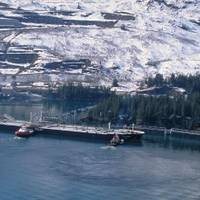
The Trans-Alaska Pipeline System (TAPS) has announced that its workforce has achieved a major safety milestone: 10 million hours worked without an OSHA Day Away From Work Case (DAFWC). Of those hours, Crowley contributed towards working 20 percent of them, or 2 million hours, safely. This means that since June 2009, no TAPS worker, including the more than 225 Crowley employees, has been injured to the extent that they missed a day of work. For more than 30 years Crowley has provided tanker escort, response ship assist and vessel operations for TAPS operator Alyeska Pipeline Services Co.
USCG Photo: Sycamore Sets Buoy in Valdez

The Coast Guard Cutter Sycamore crew sets one of two security zone buoys marking the restricted navigational area the Coast Guard patrols helping to protect the Trans Alaska pipeline terminal in the port of Valdez Thursday, Jan. 6, 2011. The Sycamore is a 225-foot buoy tender homeported in Cordova, Alaska, and is responsible for helping maintain 130 aids to navigation in Alaska. U.S. Coast Guard photo by Ensign Carla Geyer.
State Seeks Intervention in Drilling Case
Governor Sean Parnell has directed the Department of Law to ask the Ninth Circuit Court of Appeals for permission to intervene in the lawsuit by environmental groups challenging the U.S. Interior Department’s decision to approve an oil exploration plan for the Chukchi Sea. “OCS exploration and development will increase jobs and revenue for Alaskans and for all Americans,” Governor Parnell said. The state previously was granted intervention in a separate case brought by many of the same plaintiffs against an exploration plan for the Beaufort Sea. In both cases, the state has sought intervention due to the economic importance of offshore oil and gas production.
USARC Calls for Arctic Oil Spill Research
The U.S. Arctic Research Commission believes that the U.S. needs a robust research program to address spill response in broken ice, as shipping moves into the Arctic Ocean and offshore oil drilling - in several Arctic nations - moves forward. Mead Treadwell, chair of the U.S. Arctic Research Commission, prepared testimony for the August 20 field hearing in Anchorage of the U.S. Senate's Homeland Security Subcommittee of the Senate Appropriations Committee. Treadwell told the committee that, contrary to laws passed by Congress after the Exxon Valdez oil spill disaster in 1989, a significant national oil spill research program does not exist, nor is one planned to fit the special needs of the Arctic. It was anticipated that the U.S.
Alaska Upholds City of Valdez Tax on Large Vessels
On April 25, 2008, the Alaska Supreme Court held that a City of Valdez property tax, apportioned based on days docked in the City over days docked everywhere and imposed on large vessels, did not violate the Due Process, Commerce or Tonnage Clauses of the U.S. Constitution. City of Valdez v. Polar Tankers, S-12218/12223, Supreme Court of Alaska (April 25, 2008). In 2000, the City of Valdez (the "City") adopted a personal property tax (the "Vessel Tax") to compensate for its declining oil and gas property revenues. Revenues were declining as a result of a depreciation formula negotiated by the State of Alaska and the owners of the Trans Alaska Pipeline System (the "TAPS"), which included Conoco Phillips and Exxon Mobil, in the mid-1980s.
Great Ships of 2001 -- Polar Endeavour
Representing an important milestone for U.S. commercial shipbuilding, the delivery of the 141,740-dwt Polar Endeavour signaled the unfolding of a major new chapter of investment in the fleet dedicated to coastwise transportation of Alaskan crude oil. Giving first form to the Millennium concept, the tanker has been purpose-designed for trade in the world's most environmentally-sensitive waters. While Polar Tankers' main requirement of the Millennium-class is to ship crude to Puget Sound from the Trans Alaska Pipeline terminal at Valdez, the series is also suited to the needs of the traffic to California and Hawaii. The program had been implemented in 1997…
Great Ships of 2001 -- Polar Endeavour
Representing an important milestone for U.S. commercial shipbuilding, the delivery of the 141,740-dwt Polar Endeavour signaled the unfolding of a major new chapter of investment in the fleet dedicated to coastwise transportation of Alaskan crude oil. Giving first form to the Millennium concept, the tanker has been purpose-designed for trade in the world's most environmentally-sensitive waters. While Polar Tankers' main requirement of the Millennium-class is to ship crude to Puget Sound from the Trans Alaska Pipeline terminal at Valdez, the series is also suited to the needs of the traffic to California and Hawaii. The program had been implemented in 1997…









